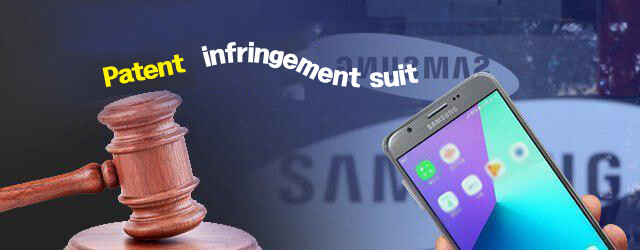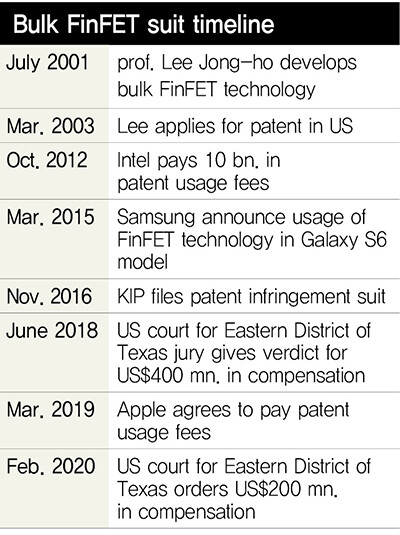hankyoreh
Links to other country sites 다른 나라 사이트 링크
US court reportedly to order Samsung to pay US$200 million for patent infringement

A US court is reportedly scheduled to deliver a ruling ordering the payment of US$200 million in compensation for Samsung Electronics’ unapproved use of mobile patent technology that companies like Apple and Intel are currently paying millions of dollars in usage fees for. Samsung Electronics plans to appeal the ruling.

According to various sources on Feb. 20, the US District Court for the Eastern District of Texas, which is conducting the first trial, issued a “conditional decision” on Feb. 13 requiring Samsung Electronics to pay US$200 million in compensation for “deliberate” infringement of a bulk in field-effect transistor (FinFET) patent held by the company KIP. The ruling becomes finalized once accepted by KIP, which filed the patent infringement suit. With KIP indicating its plans to immediately accept the court’s decision, the ruling is scheduled to be finalized within a matter of days. KIP is a KAIST affiliate specializing in patents.
Bulk FinFET is a three-dimensional transistor technology used with smartphones and tablet PCs, allowing for faster use of mobile devices by reducing power consumption. After its 2001 invention by current Seoul National University professor Lee Jong-ho -- who was employed by Wonkwang University at the time -- a patent application was filed in the US in 2003. Around July 2016, patent rights were transferred to KIP, with an agreement to share a certain percentage of the usage fees. Intel and Apple, both of which use the technology, have paid usage fees following agreements with KIP in 2012 and 2019, respectively. In contrast, Samsung, which has used the technology since 2015, has not paid usage fees. In response, KIP filed suit against Samsung Electronics for patent infringement with the Eastern District of Texas court in November 2016.
According to a copy of the court ruling acquired by the Hankyoreh, Lee Jong-ho, who submitted the initial domestic patent application in 2012, provided Samsung Electronics with an explanation of the patented technology and requested a licensing contract. Lee also requested an agreement on usage fees in 2011 and 2012, but Samsung Electronics did not agree to one. The court concluded that Samsung Electronics merely listened to Lee’s explanation of the technology before proceeding to “deliberately copy” and use it without paying usage fees.
During the trial, it emerged that Samsung Electronics attempted to encourage Kyungpook National University -- Lee's place of employment after Wonkwang University -- to claim ownership of the patent and requested a Ministry of Trade, Industry and Energy (MOTIE) investigation into allegations of KIP’s “unapproved divulgence of industry technology.” Its attempts were seen as pressure tactics to have the case thrown out or portray it as “technology leaking.”
“Samsung’s legal compliance monitoring committee was recently launched, and they held a ‘commitment to law compliance’ ceremony with the Samsung Electronics president’s board. I was at a loss as to what laws Samsung Electronics was pledging to abide by when it steals technology and doesn’t acknowledge it,” said KIP CEO Gang In-gyu in a telephone interview with the Hankyoreh.
“Rather holding out by forcing an economically disadvantaged small business to pay legal costs in the tens of billions of won and hoping that it dies off in the process, they need to immediately halt their illegal activities and pay a fair usage fee for the technology,” he insisted.
Samsung Electronics told the Hankyoreh that FinFET “is independent technology developed by Samsung”
“It’s unfortunate that the US court has accepted the claims of a company specializing in patents. We will appeal to have this recognized as Samsung Electronics’ own technology,” it added.
By Song Chae Kyung-wha, staff reporter
Please direct comments or questions to [english@hani.co.kr]

Editorial・opinion
![[Column] Season 2 of special prosecutor probe may be coming to Korea soon [Column] Season 2 of special prosecutor probe may be coming to Korea soon](https://flexible.img.hani.co.kr/flexible/normal/500/300/imgdb/original/2024/0426/3317141030699447.jpg) [Column] Season 2 of special prosecutor probe may be coming to Korea soon
[Column] Season 2 of special prosecutor probe may be coming to Korea soon![[Column] Park Geun-hye déjà vu in Yoon Suk-yeol [Column] Park Geun-hye déjà vu in Yoon Suk-yeol](https://flexible.img.hani.co.kr/flexible/normal/500/300/imgdb/original/2024/0424/651713945113788.jpg) [Column] Park Geun-hye déjà vu in Yoon Suk-yeol
[Column] Park Geun-hye déjà vu in Yoon Suk-yeol- [Editorial] New weight of N. Korea’s nuclear threats makes dialogue all the more urgent
- [Guest essay] The real reason Korea’s new right wants to dub Rhee a founding father
- [Column] ‘Choson’: Is it time we start referring to N. Korea in its own terms?
- [Editorial] Japan’s rewriting of history with Korea has gone too far
- [Column] The president’s questionable capacity for dialogue
- [Column] Are chaebol firms just pizza pies for families to divvy up as they please?
- [Column] Has Korea, too, crossed the Rubicon on China?
- [Correspondent’s column] In Japan’s alliance with US, echoes of its past alliances with UK
Most viewed articles
- 1Samsung subcontractor worker commits suicide from work stress
- 2Division commander ordered troops to enter raging flood waters before Marine died, survivor says
- 3‘We must say no’: Seoul defense chief on Korean, USFK involvement in hypothetical Taiwan crisis
- 4No good, very bad game for Korea puts it out of Olympics for first time since 1988
- 5[Column] Season 2 of special prosecutor probe may be coming to Korea soon
- 6[Editorial] Korea’s surprise Q1 growth requires objective assessment, not blind fanfare
- 7Korea’s 1.3% growth in Q1 signals ‘textbook’ return to growth, says government
- 8US overtakes China as Korea’s top export market, prompting trade sanction jitters
- 9[Column] Has Korea, too, crossed the Rubicon on China?
- 1046% of cases of violence against women in Korea perpetrated by intimate partner, study finds